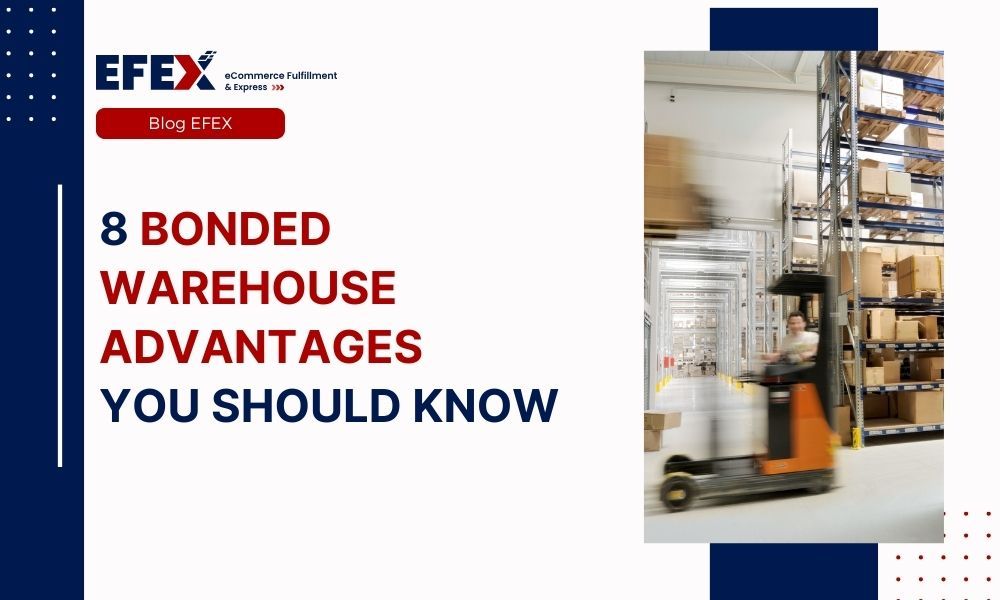
More Helpful Content
Businesses looking to make the most of their resources and ensure that goods arrive in peak condition need look no further than bonded warehouses. Bonded warehouses offer a range of advantages, such as providing flexibility for businesses, allowing companies to reduce financial risk when shipping international cargo, and offering customs duty relief.
In this article, we will discuss 8 bonded warehouse advantages that you should know.

Bonded warehousing is a facility that holds imported goods before they are released into the local market. This type of warehouse offers many advantages to importers, exporters, and manufacturers alike. Here are 8 popular bonded warehouse advantages:
Duty is only paid in a bonded warehouse once the bonded items are sold. Therefore, bonded storage may give you the breathing room you need to sell your goods or conduct further pre-sale activities.
Bonded warehousing can assist shippers in achieving this aim in two ways, including deferring import duties while goods are in storage and avoiding paying import taxes on products that will be exported. Each of these can benefit your company in a different manner.
For deferred import duties, when the product moves into a bonded warehouse, the warehouse owner undertakes an obligation, or a bond, for that merchandise. Customs charges will not be due until the goods are removed for domestic use.
Thus, transferring imported goods to a bonded warehouse can save a business a sufficient amount of money in the near future to allow it to stay afloat in the long run.

Besides, avoiding tax payments can save a company that imports to export after manufacturing or change a lot of money. While in the majority of circumstances, import duties must be paid upon arrival in a non-bonded warehouse.
Depending on the commodities, an export tax may be levied after the products are ready for sale internationally. Import duties are not needed when selling products for export.
Certain types of customs-bonded storage allow your company to modify and create imported goods without paying import taxes. Payment is postponed as long as the products do not enter the domestic market. When feasible, double taxation is avoided, resulting in an overall tax saving of 25 - 30% for some businesses.
Therefore, if demand increases abroad, your company can benefit and export for sale without paying import tariffs.
👉 Read More: All Cost To Rent A Warehouse
Finding a location for products is a typical issue in traditional trading. Goods must be kept for domestic market distribution or production for export. Dutiable imported commodities can be held in a bonded warehouse for a maximum of five years without incurring import duty.
This advantage may be useful for firms attempting to manage the obstacles of international trade in the midst of a worldwide pandemic. Bonding warehouse also secures a certain amount of duty tax.
Demand for some commodities has declined dramatically, leaving some businesses with an overabundance of inventory. Store items in these warehouses until the market for it recovers. A company can still benefit from its imports in this manner. Unless they may be obliged to sell significantly below market value in order to save money upfront.
These long-term options are offered for a wide range of items, including refrigeration, temperature control, dry storage, and other service are available.
The demands for some products, like seasonal products, are easier to predict than others. Predictability can also be found in merchandise associated with important holidays or national events.
Since bonded warehouses allow for long-term storage, you can order and store products earlier. Having in-demand items in stock may help to boost customer interactions. This allows you to give a superior experience to your customers.
Buyers will need your products, but you just do not know when they will buy. For that reason, a customs bonded warehouse comes in handy. Goods may be purchased ahead of a particular season in need, helping you remain nimble and flexible even in the face of erratic client needs.
Customs bonded warehouses are strictly controlled and subject to HMRC inspections on a regular basis. As a result, you can be certain that items are in good hands.
Furthermore, for added peace of mind, the warehouse must have strong security measures like CCTV, and completely document your items.

The bulk of bonded warehouses are situated near major seaports or airports, enabling businesses to hold their products until they are set up for distribution at the point of entry. This decreases lead times and the possibility of damage, lowering transportation costs and carbon emissions throughout the supply chain.
The majority of bonded warehouses are situated near major ports. This enables businesses to keep products at the port of entry till they are scheduled for distribution. By decreasing lead time, transportation costs, and potential damage, these bonded warehouses may save money across the whole supply chain.

A bonded warehouse is a location where merchants can hold imported products until they are processed by customs. Customs taxes are not levied on goods held in bonded warehouses. All relevant duties are payable after the items have been shipped to their final locations.
Bonded warehouses are classified into two types, which are wet and dry. Wet bonded warehouses can store alcohol and tobacco. The majority of other imported commodities may be stored in dry bonded warehouses.
Utilizing a bonded warehouse allows you to send your items faster to their intended destination. It also implies that duty payments might be deferred until the commodity has been relocated.
Overall, bonded warehouse advantages for your business are numerous. Whether dealing with challenges in international trade or looking for ways to improve overall efficiency, utilizing a bonded warehouse can be a valuable strategy for businesses of all sizes.
EFEX provides secure and efficient bonded warehousing solutions for businesses looking to optimize their supply chain operations. With our strategically located facilities near major ports of entry, we can keep your goods safe and compliant while reducing lead times and carbon emissions.
Feel free to contact us today to learn more about our bonded warehousing services and how we can help your business thrive in the global marketplace. Keep your goods secure, save on taxes, and improve customer service with EFEX's bonded warehouse solutions. So why wait? Contact us now!


